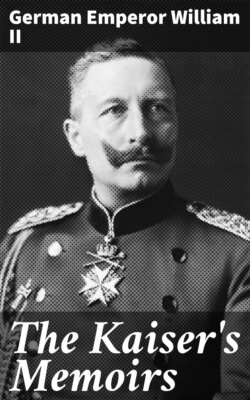Читать книгу The Kaiser's Memoirs - German Emperor William II - Страница 19
На сайте Литреса книга снята с продажи.
HANDLING A COAL STRIKE
ОглавлениеTable of Contents
The great Westphalian coal workers' strike in the spring of 1889 took the civil administration by surprise, causing great confusion and bewilderment, especially among members of the Westphalian provincial administration. From all sides came calls for troops; every mine owner wanted, if possible, to have sentries posted outside his room. The commanders of the troops which were summoned immediately made reports on the situation as they had found it.
Among these was one of my former barrack comrades, belonging to the Hussar Guard Regiment, von Michaelis by name, who was famous as a wit. He rode, alone and unarmed, among the striking crowds of workers, who—the early spring being remarkably warm—were camped upon the hillsides, and soon managed, by his confidence-inspiring, jovial ways, to set up a harmless intercourse with the strikers. By questioning them he obtained much valuable information about the grievances—real and imaginary—of the workers, as well as about their plans, hopes, and wishes for the future. He soon won for himself general appreciation and affection among the workers and handled them so well that complete quiet reigned in his territory. When I, on account of nervous and worried telegrams from the big industrial leaders and officials received at the office of the Imperial Chancellor, inquired of Michaelis how the situation stood, the following telegraphed answer came from him: "Everything quiet excepting the Government officials."
A mass of material was collected, during the spring and summer, from the announcements and reports received which showed clearly that all was not well in industrial circles; that many a wish of the workers was justified and, to say the least, entitled to sympathetic investigation on the part both of the employers and of the officials. The realization of this, which was confirmed in me when I questioned my former private teacher, Privy Councilor Dr. Hinzpeter—a man particularly well informed on social phenomena, especially those in his own province—caused the resolve to ripen in me to summon the State Council, include employers and employees in its deliberations, and bring about, under my personal direction, a thorough investigation of the labor question. I decided that in so doing guiding principles and material were to be acquired which would serve the Chancellor and the Prussian Government as a basis for working out appropriate projects for new laws.
Inspired by such thought I went to His Excellency von Bötticher, who at once prophesied opposition on the part of the Chancellor to such action, and advised strongly against it. I stuck to my ideas, adducing in support of them the maxim of Frederick the Great: "Je veux être un Roi des gueux" ("I wish to be King of the rabble"). I said that it was my duty to take care of those Germans who were used up by industry, to protect their strength and better their chances of existence.
